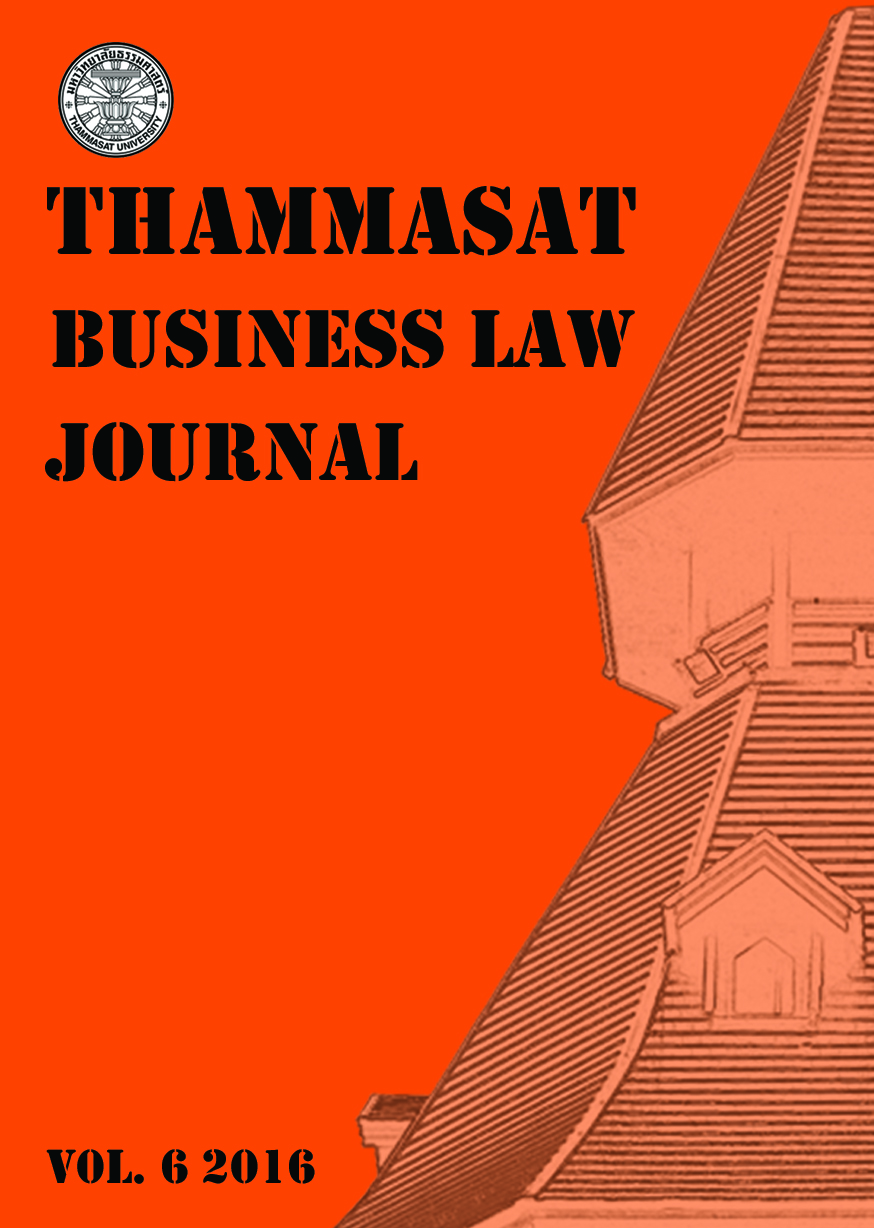PROBLEMS OF CONSUMER PROTECTION RELATING TO TRADEMARK LAW A CASE STUDY IN REGARD TO USAGE OF UNFAIR METHOD TO CAUSE CONFUSION ON AUTHENTICITY OF TRADEMARK OWNERSHIP
Main Article Content
Abstract
At present, some business operators use dishonest methods to run their businesses. For example, they imitate trademarks or packaging of other businesses in order to use well-known trademarks and confuse the consumer. In some cases, trademark law may not give sufficient protection of the consumer’s interests. Some business operators have registered or changed the juristic person’s name by using the trademark of others without the permission of the trademark owner, or have used part of another’s trademark as their own. This causes confusion to the consumer who may think that the trademark owner and such juristic person are the same or an affiliated company. The consumer may buy products or receive services from the juristic person who is using another’s trademark because they rely on the quality of the real trademark owner. This causes damage to the consumer who does not receive the products or services from the real trademark owner, and the product or service from the business operator who is not the real trademark owner may not have been of an equal quality to the product or service from the real trademark owner.
Under Thai law, there are many laws which are intended to protect the consumer. However, in the case that the business operator has registered or changed its juristic person’s name by using the trademark of others or part of it without permission and causes confusion to the consumer, the consumer does not receive proper protection under Thai law.
Under international law, there is an unfair competition principle in the Paris Convention. Any act of competition contrary to honest practices such as causing confusion, discrediting competitors and misleading the public is prohibited under international law. The act of some business operators above can be considered as unfair competition.
Since the present Thai law may not apply to protect the consumer who confused on authenticity of trademark ownership, in order to resolve this problem, the article proposes that the legislature should enact a new special statute covering unfair competition.
The unfair competition law should set out the acts that will be considered as unfair competition and include the acts which causes the consumers to confuse on authenticity of trademark owner for giving the protection to the consumer.
Article Details
References
Bodenhausen, G.H.C. Guild to the application of the Paris Convention for the protection of industrial property as revised at Stockholm in 1967. Geneva: WIPO, 1997.
Henning-Bodewig, Frauke. International Handbook on Unfair Competition. Munchen: C.H. Beck., 2013.
Jacob, Robin, and Daniel, barrister Alexander. A Guidebook to Intellectual Property: Patents,Trade Marks, Copyright, and Designs. 4th ed. London: Sweet & Maxwell, 1993.
Torremans, Paul. Holyoak & Torremans Intellectual Property Law. 7th ed. Oxford: Oxford University Press, 2013.
ธัชชัย ศุภผลศิริ. คำอธิบายกฎหมาย เครื่องหมายการค้า. กรุงเทพมหานคร: สำนักพิมพ์นิติธรรม, 2536. (Tatchai Supaponsiri. Textbook on Trademark Law. Bangkok: Nititham Publishing House, 1993).
สุษม ศุภนิตย์. คำอธิบายกฎหมายคุ้มครองผู้บริโภค. พิมพ์ครั้งที่ 9. กรุงเทพมหานคร: สำนักพิมพ์แห่งจุฬาลงกรณ์มหาวิทยาลัย, 2557. (Susom Supphanit. Textbook on Consumer Protection Law. 9th ed. Bangkok: Chulalongkorn University Publishing House, 2014).
WIPO. “Protection against Unfair Competition Analysis of the Present World situation” Geneva WIPO. 1994.
พงษ์เดช วานิชกิตติคุณ. “ปัญหาบางประการเกี่ยวกับการลวงขาย” บทบัณฑิตย์ (เนติบัณฑิตยสภา). เล่มที่ 56 (2543): หน้า 93-103 (Pongdeat Wanitkittikhun. “Some Problem Issues Relating to Passing Off” Bot Bundit (Thai Barrister). no.56 (2000): p.93-103)
วิชัย อริยะนันทกะ. “ข้อสังเกตบางประการเกี่ยวกับกฎหมายเครื่องหมายการค้าและการป้องกันการแข่งขันที่ไม่เป็นธรรม (1)”. บทบัณฑิตย์ (เนติบัณฑิตยสภา). เล่มที่ 58 (2545): หน้า 101-135. (Vichai Ariyanuntaka. “Some Notices relating to Trademark Law and the Protection against Unfair Competition (1)”. Bot Bundit (Thai Barrister). no. 58(2002): p.101-135)
นลินธร ชาติศิริ. “การกระทำอันเป็นการแข่งขันอันไม่เป็นธรรมทางการค้าและสภาพบังคับตามกฎหมาย : ศึกษากรณีเฉพาะทรัพย์สินอุตสาหกรรม”. วิทยานิพนธ์มหาบัณฑิต คณะนิติศาสตร์ จุฬาลงกรณ์มหาวิทยาลัย, 2539 (Nalinthorn Chartsiri. “Unfair Competition and Legal Sanctions: A Case Study of Industrial Property”. Master of Law’s Thesis. Chulalongkorn University, 1996)


